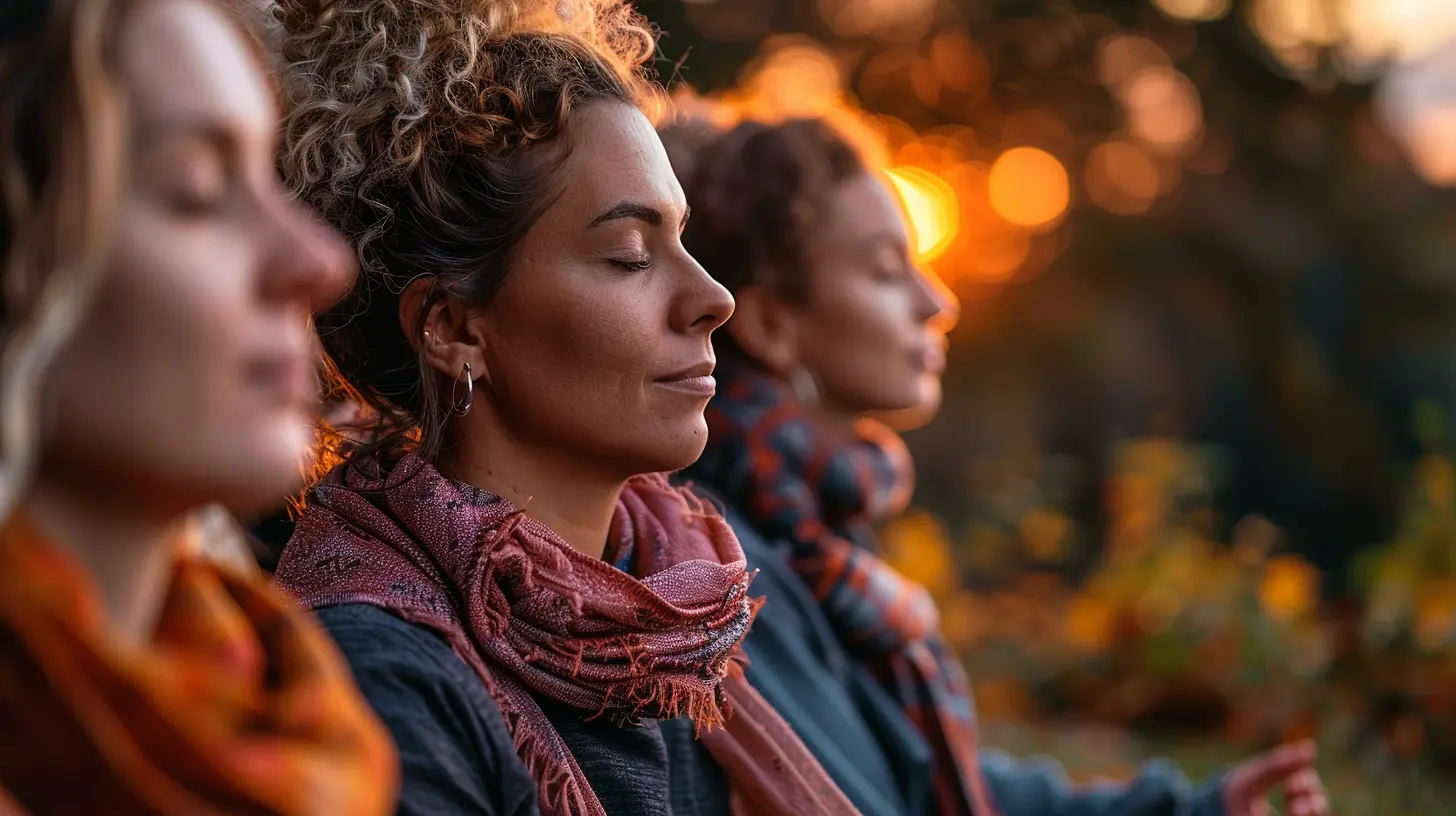Using Meditation to Develop Better Relationships
30 September 2025
Relationships are the heart of human experience, right? Whether it’s your partner, family, friends, or co-workers—how we connect with others shapes so much of what we feel daily. But let’s face it: relationships aren’t always smooth sailing. Between misunderstandings, stress, ego clashes, and just the sheer busyness of life, it’s easy for disconnection to creep in.
Now, imagine having a tool—always accessible, totally free—that helps you build stronger, more loving, and deeper connections with people around you. That tool is meditation. Yep, the same practice known for calming your mind and increasing focus can also be a game-changer for your personal and social life.
In this article, we’re diving into how using meditation to develop better relationships isn’t just some woo-woo concept—it’s a practical, science-backed approach to forming meaningful bonds.
Why Relationships Need Maintenance (Just Like Your Car)
Think about it: you wouldn’t drive a car for years without getting an oil change, right? Relationships need the same regular care and attention. Without maintenance, little issues pile up, communications stall, and resentment can sneak in like rust on a bumper.Meditation helps you tune into yourself and others. It gives you the clarity to notice what’s ‘off’ before it turns into something bigger. When you’re centered and mindful, you’re not just reacting—you’re responding with intention. Big difference.
What Exactly Does Meditation Do to Your Mind?
Before we get into the relationship stuff, let’s break down what meditation actually does neurologically and emotionally.- Reduces stress hormones: Meditation lowers cortisol levels. Less stress = more patience and emotional resilience.
- Enhances emotional regulation: You get better at recognizing and managing your emotions.
- Increases self-awareness: That inner dialogue? Meditation helps you notice it, observe it, even change it.
- Boosts empathy and compassion: Loving-kindness meditation literally rewires your brain for compassion. That's real science.
And all these benefits? They naturally flow into how we interact with others. Let’s unpack how.
How Meditation Helps You Connect on a Deeper Level
1. You Become a Better Listener
When was the last time you really listened to someone without planning your next sentence in your head?Mindfulness meditation teaches you to stay present. That means when your friend is venting, you’re not nodding while mentally checking your grocery list. You’re actually there, hearing them. And people notice that. It builds trust.
> "Listening is an act of love." — it’s a simple truth, but so often overlooked.
2. You Respond Instead of React
Ever snapped at someone in the heat of the moment and regretted it two minutes later? We’ve all been there.Meditation helps create a pause between a trigger and your reaction. Instead of flying off the handle, you’re able to take a breath and respond thoughtfully. That pause can save a conversation—or a relationship.
3. You Develop Compassion (Even When You’re Right)
Let’s admit it: we're not always the easiest people to be around. Neither are our loved ones. Disagreements happen. But meditation, especially practices like loving-kindness (also known as Metta meditation), boosts empathy even when you’re feeling frustrated.You learn to see others as humans with their own struggles, instead of adversaries in an argument. That shift takes you out of the “me vs. you” mindset and into “we’re in this together.”
—

Meditation Practices That Improve Relationship Dynamics
Not all meditation is created equal. Some styles are better suited for emotional intelligence, empathy, and connection. Here are a few you might want to try:1. Mindfulness Meditation
Think of this as your foundation. You sit quietly, focus on your breath, and gently bring your mind back when it wanders.How it helps relationships:
You get better at noticing your thoughts and emotions in real-time. It trains you for those high-stakes moments when you need to stay calm or make a conscious decision in your relationships.
2. Loving-Kindness Meditation (Metta)
This one’s a bit different. You silently repeat phrases like “May I be happy” or “May you be free from suffering” toward yourself and others—yes, even people you dislike.How it helps relationships:
It softens your heart. Over time, you feel more empathy and less judgment toward others. Great for healing old wounds or dealing with difficult people.
3. Body Scan Meditation
Here, you lie down or sit and mentally scan your body from head to toe, noticing sensations without reacting.How it helps relationships:
It trains you in patience and self-awareness, both of which are clutch when you’re navigating someone else's emotional storm.
Real-Life Situations Where Meditation Improves Relationships
Let’s bring this into the real world. Here are a few common relationship challenges, and how meditation helps you navigate them more gracefully.Heated Arguments With a Partner
You know the ones—it starts over something small and spirals into a full-blown fight. Meditation gives you the awareness to notice the escalation and the tools to hit pause before it gets ugly.You might think, “Okay, I’m feeling triggered. Let me breathe for a second,” instead of yelling something you’ll regret.
Feeling Disconnected From Loved Ones
Sometimes we go on autopilot. Same routines, surface-level conversations—it happens. Meditation brings you back into presence. When you’re present, you notice more: the tone in your partner’s voice, the emotion behind your friend’s silence. And you can show up accordingly.Workplace Tension
That co-worker who drives you up the wall? Meditation can help you reframe how you see them. Instead of labeling them as “difficult,” you might begin seeing them as stressed or insecure. That perspective change can shift the entire dynamic.How to Start Meditating for Your Relationships
You don’t need to sit in lotus position for hours or go on a silent retreat to see results. Here's a simple way to begin.1. Start Small
Aim for five minutes a day. Yes, just five. Get comfy, close your eyes, and focus on your breath. That’s it.2. Use a Guided Meditation App
Apps like Insight Timer, Headspace, or Calm offer meditations specifically for relationship-building, compassion, or mindfulness. Easy-peasy.3. Be Consistent
Like with any skill (yep, emotional intelligence is a skill), consistency is key. The benefits build up over time like compound interest.A Note on Self-Love (Because That’s a Relationship Too)
Let’s not forget the most important relationship you’ll ever have—the one with yourself.Meditation strengthens self-acceptance. It helps you get cozy with your flaws, injuries, and humanness. And when you stop being so hard on yourself, guess what? You stop being so hard on others too.
Loving yourself doesn’t mean you think you’re perfect. It means you know you’re worthy of love—and that makes it easier to give and receive it in your relationships.
Final Thoughts: Meditation Isn’t Magic, But It’s Pretty Darn Close
Will meditation make all your relationships perfect? No. But it will make you a better communicator, a deeper listener, a more patient partner, and a more compassionate human being. And honestly, that’s a giant leap forward in any relationship.It’s like upgrading your emotional GPS system. Less getting lost in drama. More knowing how to navigate through love, frustration, vulnerability, and connection.
So, the next time you feel like your relationships could use a tune-up, don’t just reach for advice columns or role-play scripts. Sit down. Close your eyes. Breathe. And let meditation do its quiet, powerful work.
all images in this post were generated using AI tools
Category:
MeditationAuthor:

Holly Ellison
Discussion
rate this article
1 comments
Caelestis Wright
Loved this article! It’s amazing how meditation can enhance our connections with others. Taking a few moments to breathe and reflect can really transform relationships. Excited to try these tips! 😊
October 22, 2025 at 4:46 PM

Holly Ellison
Thank you for your kind words! I'm glad you found the tips helpful. Enjoy your meditation journey! 😊


